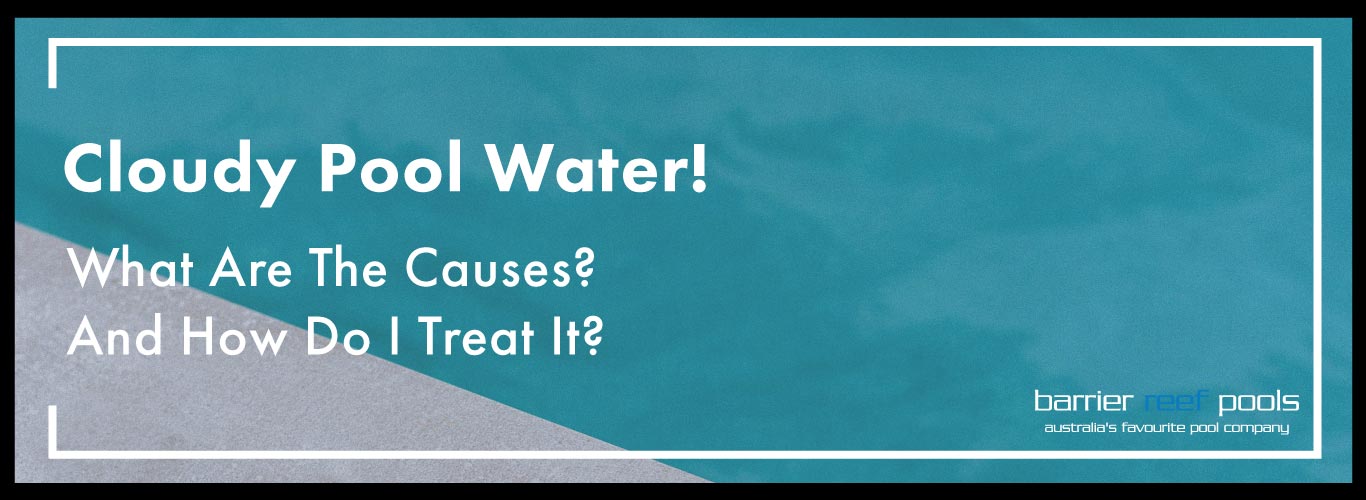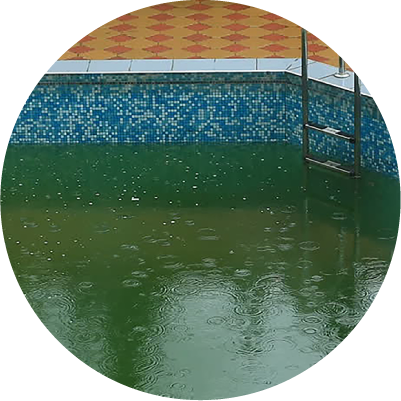Cloudy Pool Water - What Are The Causes? And How Do I Treat It?
Is your pool water looking think and dark? Has it become difficult for you to see clearly when you’re underwater?
Clouding is one of the most common challenges that home pool owners face. While it can be a cumbersome issue when you’re swimming, it can be easily solved. In this article, we’ll look at how you can transform your pool water from cloudy to clear within hours and resume your swimming.
But first, let’s understand why your pool water clouds in the first place.

8 Reasons For Milky And Murky Pools
There Is A Lot Of Debris And Pollution In Your Pool
If your fibreglass pool is situated just below or adjacent to a tree or large plant, then the debris from that plant might fall into your pool. Any animals living in the tree, may also leave behind droppings, seeds and pollen inside the water. Over a period of time, this can cause your pool to get cloudy because of the presence of all the debris.
Additionally, pollution hanging in the air might settle into the water, worsening the situation.
Your Pool Filter Isn’t Doing A Good Job
Pool filters are designed to remove any debris, dirt and chemicals that are present in your fibreglass pool water. But if your filter is faulty or it becomes really old, then it may not be efficient enough in cleaning and purifying your pool water. This can leave behind a lot of debris that can make your water dark and milky.
Your Pool Water Has A High Ammonia Content
Bacteria live inside your pool water and usually they don’t harm you. But these bacteria produce small amounts of ammonia, which over a period of time, increases in concentration in the water. If your pool filter isn’t strong enough, this ammonia may continue to build up in your pool, causing it to cloud.
The Pool pH Balance Isn't Correct
The ideal pool water pH balance should be between 7 and 7.6. Anything below 7 indicates that the pool water is acidic. Anything over 7.6 indicates the pool water is too alkaline. Either way, both extremes are bad.
Usually, high and low pH levels can wreak havoc on your pool by corroding your pipes and surfaces. But the great thing about fibreglass pools is that fibreglass material is non-reactive and corrosion-resistant.
However, although your fibreglass pool will hold up well if the pH balance of your pool is imbalanced, it’s still not good for your water, your body and your health.

There Is A Thick Algae Build-Up In Your Pool
Algae grow wherever water is. But with a good filtration system and the right algaecide, you can control their growth. But when you have neither, algae can grow very fast and cause your pool to quite literally fog-up. Not only will the algae form a thin, cloudy sheet, but they’ll also release ammonia that can make your pool water further milky.
The Pool Water's Calcium Levels Are Imbalanced
Calcium deposits are used to evaluate how hard your pool water is. If the calcium deposit is low, your pool is filled with soft water and the chances of clouding are less. But, if your pool is very hard water, then the calcium deposits in your pool will cause the water to become thick and murky.
The presence of calcium in your pool water can also cause a thin chalky film to form over your fibreglass pool, which needs to be cleaned to improve your pool’s aesthetics.

You Use The Wrong Concentration Of Chlorine
When you use chlorine to purify your water, the chlorine particles dissolve in the water and cling to the dirt particles, neutralizing them. But simultaneously, these chlorine particles become ineffective too. This is called combined chlorine, i.e., chlorine combined with dirt.
Only the remaining free chlorine particles will be effective in cleaning your pool water. But if you start out by pouring the wrong concentration of chlorine powder/pellets into your pool, there won’t be much free chlorine left to clear your water of debris and algae. This can cause your pool to cloud.
At the same time, adding too much chlorine can also cause your pool to cloud, since the chemicals in the chlorine will mess up your pool’s pH levels.
You Live In The Rain-Heavy Part Of Australia
There are many parts of Australia that receive heavy rainfall. Rain falling into your pool can bring in debris and dirt, which can make your pool cloudy.

Best Ways To Keep Your Pool Water Clean And Cloud-Free
The good news is, you can un-cloud your pool easily. Here are a few things you can do:
Clean Out Or Replace Your Pool Filters
The first thing to do when your pool is getting cloudy, is to check your filter. Over a period of years, your pool filters will have clogged-up and this may be why it’s unable to filter out any other particles. By giving your filter a good clean, you can remove any guck in it.
If the filter appears to be clean, but you’re certain it is the cause of the clouding, replace it. Best practice dictates that pool filters be changed every two years.

Get A More Powerful Pump
Sometimes, pool owners make the mistake of choosing a pump that is the wrong size for their pool. A smaller pump for a big pool just won’t be powerful enough to keep up a steady stream of clean water to your pool. This may cause your water to stagnate, increasing the chances of algal growth.
So, check with a professional fibreglass pool installer if the pump you have is the right one and replace it if it isn’t.
Shock Your Pool With The Right Chemicals
“Shocking” refers to the process of adding specific combinations of chemicals into your pool water, to help bring the pool water back into the right chemical conditions.
The type of shock materials you use, will depend on the chemical state of your water, i.e., its pH level, calcium concentrate, presence of other trace minerals and chemicals, chlorine rate etc.
So, if your pool is clouding because your chlorine levels are low, you should shock your pool water with sodium hypochlorite, calcium hypochlorite, lithium hypochlorite or dichlor and trichlor. But if other minerals and chemicals are causing an imbalance in your pool’s pH levels, then use a non-chlorine shock such as Potassium monopersulfate.
“Shocking” refers to the process of adding specific combinations of chemicals into your pool water, to help bring the pool water back into the right chemical conditions.
Increase The Frequency Of Pool Water Cleaning
As a general best practice, consider having a weekly pool cleaning routine. Shock your pool with chlorinated and non-chlorinated shocks on alternate weeks. Use a powerful algaecide every few weeks to prevent algae build-up. Also, manually rub-off the chalky layer of calcium deposit on your fibreglass pool. This will prevent the calcium from constantly mixing with your pool water.
Get A Pool Cover To Prevent Rain And Debris From Falling In
A pool cover can be a godsend when you want to keep your pool water clear and light. Since you keep the pool covered, there is little chance of rain, dirt, debris and pollution from contaminating your water.
Of course, you need to remember to remove the pool cover for an hour or two each day, to prevent the water form warming up and growing more algae. If you have to keep your pool covered for days at a stretch, consider manipulating the water’s conditions by shocking it with the right anti-algae chemicals.

Use Clarifiers And Flocculants To Remove Tough Particles
Pool water clarifiers and flocculants are two very powerful ways of treating your cloudy water.
Clarifiers act like coagulants, clumping together the smaller and invisible particles of dirt, so they can be either manually removed or filtered carefully. Flocculants work better on larger debris, by clumping them together and sinking the dirt down to the floor of the pool. You will need to use a pool pump or manually collect these dirt clumps and dispose-off them.
Clarifiers are better if you have mild cloudiness and don’t intend to swim in the pool for long. They can take a while to work, but they’re effective. Flocculants are ideal if you have sand, mud, loose stones and other heavy debris. They’re great if you want to remove these quickly before, say a party. But you may lose some water in the process of vacuuming out the debris clump.
Test Your Pool Water Regularly To Understand How It Reacts To The External Environment
So far, we’ve looked at ways to reverse the cloudiness of already-cloudy water. But to prevent your water from turning milky and murky, you need to check the water conditions regularly.
You can good-quality water testing kits online, which allow you to test the chemical concentration and pH balance of your water. By taking weekly readings and tracking how your pool water reacts to climate changes or certain debris, you’ll be able to take the steps necessary to constantly keep you water clear and free of clouds.
For more information, contact us today! We are Australia’s premier fibreglass swimming pool installers. We can help you install and repair fibreglass pools.
